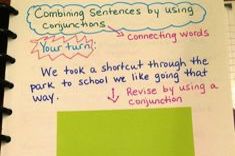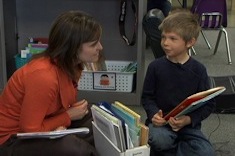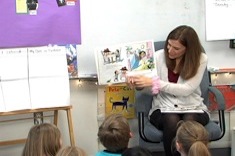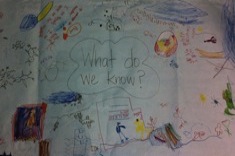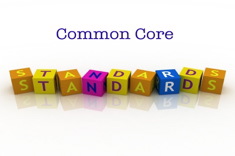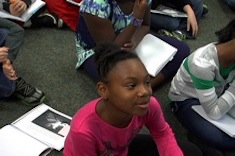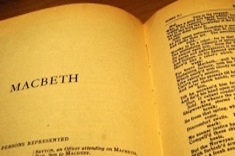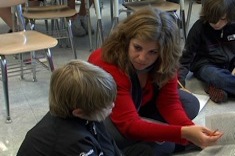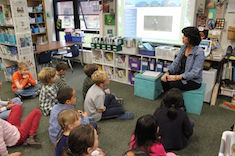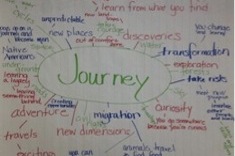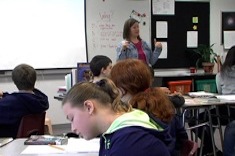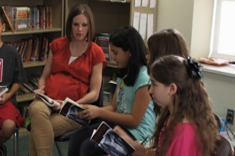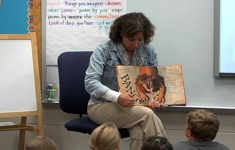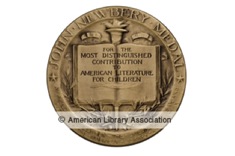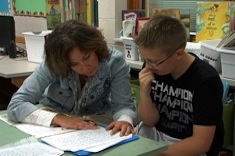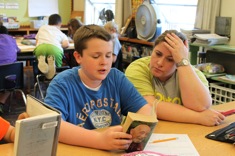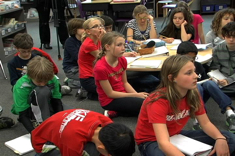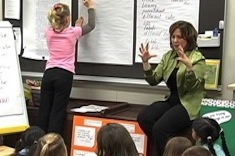Teaching Reading
Our contributors lead reading workshops in classrooms with creative flair. Over the past 12 years, we've filled our site with loads of suggestions, tools, and tips for using engaging books throughout the curriculum to hook kids on reading. Here is where you will find many stories of successful and not-so-successful workshop days, and what we learned from them. We bring these stories to life through hundreds of video examples.
Latest Content
Explanatory Grammar Moves: Getting Verbal with It
Jeff Anderson concludes his series on explanatory grammar moves by exploring participles, included in the Common Core eighth-grade standard covering the use of verbals.
Making Classics Relevant for Middle School Students
Jennifer Schwanke helps middle school students make connections between classics and their current reading.
Conferring with Sebastian
Katie DiCesare chats with first grader Sebastian in this one-minute conference, then shares her reflections on where Sebastian might go next in his reading.
Liberty and Dystopia: February Literacy Contracts
Megan Ginther and Holly Mueller focus their February Literacy Contracts on dystopias.
Exploring Inferring with Second Graders: Part 1
Linda Karamatic uses a read aloud to launch a group activity to build understanding of inferring.
The Shape of Stories
Mary Lee Hahn explores story structure with her fifth-grade students. This is a terrific activity for helping older students understand increasingly complex story structures as they move through the intermediate grades.
Act III: Exploring Subtext with A Midsummer Night’s Dream (Shakespeare and the Common Core Series)
Gretchen Schroeder concludes her Shakespeare in the Age of the Common Core Series with activities to explore subtext in A Midsummer Night’s Dream.
Penguins Are Amazing!: Informational Writing Comes Alive in Kindergarten
Can kindergartners do informational writing? Keri Archer finds the answer is yes, as she applies Common Core standards to inquiry work in her classroom.
Common Core Research Shifts
Maria Caplin explains four changes she is making in her fifth-grade classroom with writing instruction because of the Common Core.
Whole Class Research Planning in 4th Grade
Andrea Smith’s fourth graders brainstorm next steps for their research project on owl habitats, which includes writing a research proposal.
Act II: Understanding Hamlet Through Close Reading (Shakespeare and the Common Core Series)
Gretchen Schroeder continues her Shakespeare and the Common Core series on teaching the classics in high school, explaining how she uses Hamlet in creative ways to teach close reading strategies.
Act I: Delving into Deep Questions with Macbeth (Shakespeare and the Common Core Series)
Gretchen Schroeder launches a three-part series on Shakespeare in the Age of the Common Core. This week’s installment is a fresh take on teaching Macbeth to high school students.
Tracking Characters: A Conferring Tip
Aimee Buckner teaches a fourth grader a strategy for using a sticky note to keep track of characters when there are multiple narrators in a novel.
A Closer Look at Engagement
Are the terms stamina and engagement synonymous? Cathy Mere defines the terms by observing her first graders.
Journeys and Quests: January Literacy Contracts
Middle school teachers Megan Ginther and Holly Mueller focus on journeys and quests as the theme of their January Literacy Contracts in the latest installment of their year-long series.
Modeling Annotation in 8th Grade
This video from Katie Baydo-Reed’s eighth-grade classroom is the second part of a series on teaching annotation skills in middle school. A catch-up link to the first video in the series is provided.
Tell Me More
Gretchen Taylor finds the three little words “tell me more” provide breakthroughs in helping her middle school students respond to reading.
Explanatory Grammar Moves: Right-Branching Sentences
Jeff Anderson continues his Explanatory Grammar Series with a feature on the power of right-branching sentences.
Second-Grade Minilesson on Capital Letters
Ruth Ayres presents a minilesson on capital letters to a second-grade class.
Mock Newbery Club
Katherine Sokolowski has suggestions for organizing and hosting a Mock Newbery Club in the weeks before the award is given in late January.
Exploring Winter with Short Texts
Middle school teachers Megan Ginther and Holly Mueller focus on winter in short texts as the theme of their December Literacy Contracts in the latest installment of their year-long series.
Curating a Nonfiction Classroom Library
Franki Sibberson writes about how her thinking about nonfiction is changing her classroom library in this first installment of a four-part series.
Powerful Conferences
Ruth Ayres explains how deciding the purpose of conferring in advance can lead to more powerful conferences.
Better Reading Conferences
Katherine Sokolowski describes how she worked over the past few years to initiate better reading conferences.
Thinking About Theme
Karen Terlecky explains how she designs instruction and uses mentor texts to teach theme, and includes a video example of a minilesson.
November Contract: Family and Memoir
The November installment of Megan Ginther and Holly Mueller’s yearlong literacy contract series has a theme of family and memoir.
Shared Blogging in the Primary Classroom
Shared reading and shared writing are essential instructional techniques in the primary grades. How about shared blogging for teaching children basic blogging skills? Cathy Mere describes how it works.
Kindle Highlights: Conferring with Nicole
If you’ve ever used a Kindle reader, you might be fascinated by the highlighted notes of other readers. Franki Sibberson uses those notes in a conference with Nicole.
Dandelions, Chinese, and Patience with Our Youngest Learners
Kelly Petrin meditates on the importance of trust and patience when looking for ways to connect with preschoolers.
Two Lessons for Teaching Theme
Franki Sibberson writes about how she chooses books for theme instruction and shares two lessons.
Browse Content By
Type
Category
- Assessment Tools
- Big Fresh Archives
- Booklists
- Choice Numeracy
- Classroom Design
- Common Core
- Community Building
- Conferring
- Content Literacy
- Digital Literacy
- English Language Learners
- Equity
- Family Relations
- Free Samples
- Guiding Groups
- Leadership
- Literacy Coaches
- Mentor Texts
- Minilessons
- New Teacher Mentors
- Podcasts
- Poetry
- Quote Collections
- Reading Strategies
- Self Care
- Struggling and Striving Learners
- Talking and Listening
- Teacher Study Groups
- Teaching Reading
- Teaching Writing
- Word Study and Vocabulary
Author
- Melissa Quimby
- Nawal Qarooni
- Gwen Blumberg
- Julie Cox
- The Lead Learners
- Hannah Tills
- Josie Stewart
- Ruth Metcalfe
- Mallory Messenger
- Becca Burk
- Jodie Bailey
- Vivian Chen
- Mary Brower
- Tiffany Abbott Fuller
- Stephanie Affinito
- Ruth Ayres
- Leigh Anne Eck
- Heather Fisher
- Shari Frost
- Julie Johnson
- Suzy Kaback
- Gigi McAllister
- Shirl McPhillips
- Melanie Meehan
- Cathy Mere
- Debbie Miller
- Tara Barnett and Kate Mills
- Tammy Mulligan
- Dana Murphy
- Bitsy Parks
- David Pittman
- Brenda Power
- Heather Rader
- Matt Renwick
- Mandy Robek
- Christy Rush-Levine
- Gretchen Schroeder
- Jen Schwanke
- Brian Sepe
- Katherine Sokolowski
- Stella Villalba
- Jennifer Vincent
Grade Level
Choice Literacy Membership
Articles
Get full access to all Choice Literacy article content
Videos
Get full access to all Choice Literacy video content
Courses
Access Choice Literacy course curriculum and training

